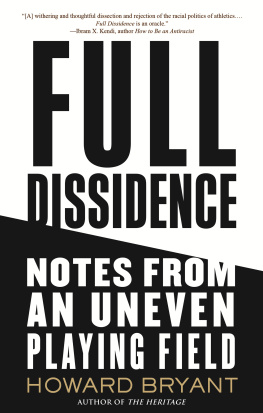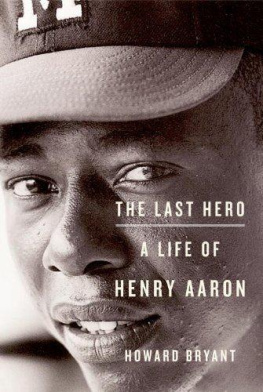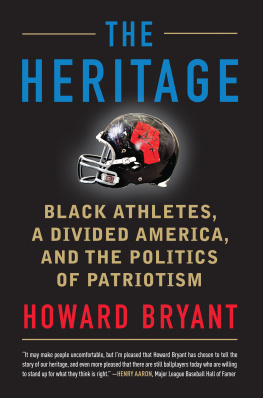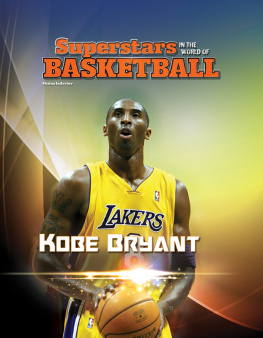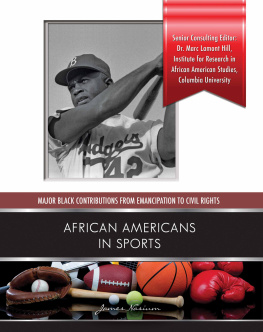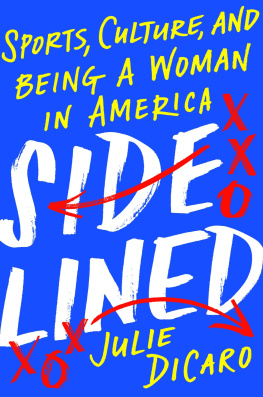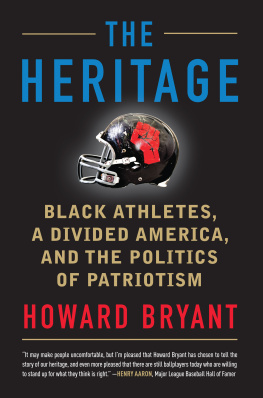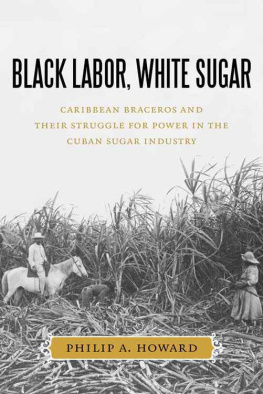Table of Contents
Pagebreaks of the print version
Guide
OTHER BOOKS BY HOWARD BRYANT
Shut Out: A Story of Race and Baseball in Boston
Juicing the Game: Drugs, Power, and the Fight for the Soul of Major League Baseball
The Last Hero: A Life of Henry Aaron
The Heritage: Black Athletes, a Divided America, and the Politics of Patriotism
THE LEGENDS SERIES FOR YOUNG READERS
Legends: The Best Players, Games, and Teams in Baseball
Legends: The Best Players, Games, and Teams in Football
Legends: The Best Players, Games, and Teams in Basketball
Sisters and Champions: The True Story of Venus and Serena Williams
For Tisa
INTRODUCTION
To be black is to be a dissident. At some unspecific point over the past quarter century, and likely long before, America convinced me of this. The seismic wreckage of Ferguson, the daily, microscopic humiliations produced first by the pollsters who reveal that high percentages of whites believe black people have it better than whites and then later by the ones who think we deserve our wretched conditions, certainly confirmed it. Democrat or Republican, protestor or appeaser, lover or fighter, black life in America is one of navigation, for the moment black people issue a grievance of any size, the white mainstream backlash is loud and swift, the strategies and tactics we have employed to find acceptance as Americans collapseand we are told we can go back to Africa.
The thought stuck, as important thoughts do, and as a result the traditional framings of and solutions to racial questions in this country felt increasingly insufficient, limiting, patronizing. There has been so much shrapnel. The historical arc of black triumph followed by harsh white response was not only instructive in understanding the big issues, such as Reconstruction or the half century of mobilized white response to Brown v. Board of Education, but it also felt very much a part of a menacing present marked by the throaty and effusive rejection of history itself. Even at this late date, despite decades of taxpayer-funded data to the contrary, countless funerals and billions of dollars in taxpayer-funded civil lawsuits, Americans still argue whether police interact with black citizens with more hostility and violence. Americans, twenty years into the fifth century of European inhabitance, still debate whether its white founders intended a nation by white people, for white peopleeven though the foundations of this country can be routinely found in any eighth-grade history textbook. This country is proud to accept nothing of its own past. It cannot even get the basics right, and it is exhausting.
Dissidence can never be a place of origin but is rather a destination, a conclusion after the long journey that faithin the ballot, the corporate partnerships, the diversity and inclusion initiatives, the Rooney Rules, or just Americas belief in its own exceptionalismis no longer an option, and was probably never a particularly good one in the first place. It is the realization that our conventional strategies and solutions have been, if not illegitimate, then failures of mission. It is a break with the mainstream, and a finding of comfort living outside of it.
This book addresses that beginning following the end of exhaustion, a collection of essays that examine varied spaces of the front lines: blackness, where advocating for black people is treated as a punishable offense and, in a time of increasing hostility from the locker room to the White House, one of insurrection; of an authoritarian state, where no amount of evidence or video or debt will shake Americans from their fidelity to police at home and a runaway war machine abroad; to surrender relinquishing the concept of public wealth and to the acceptance of corruption as a value, all enveloped in a vapid but influential celebrity culture.
This collection of essays is not a how-to survival guide for a darkening time but an individual response to the malignant behaviors that have enveloped us. They are, at the end of the journey, a declaration of rejection.
ORIGINS
Once, appearing on ESPN to discuss the controversy of Colin Kaepernick not voting, I suggested that instead of his abstinence disqualifying his say on the American situation, perhaps he had gone full dissident and recognized the accepted framework of sociopolitical involvementthe ride-alongs with cops, the listening to candidates owned by money, the insistence that deliberate, institutional racism is just a misunderstanding still unsortedand found them useless. I further argued that if he saw an unredeemed, corrupt system as the problem, there was no reason for him to trust in it and even less reason to expect him to participate in it.
Full dissidence may or may not have applied to Kaepernick, but it certainly felt personal. The thoughts were neither new nor revelatory, certainly not to me or any black person who reaches a certain age, a certain rage or breaking point, but they were nevertheless true: Donald Trumps installation as president was a proud and unhidden repudiation of the nations first black president, and no matter how many attempts at misdirection toward economic anxiety or some other, greater complex phenomenon, some element of taking back proprietorship of the country had appealed to an overwhelming number of white people who voted for him. With Trumps lies and distortions normalized by an overmatched, often complicit free press, the writer Michiko Kakutani referred to his presence as the death of truth. Dozens of books followed along similar themes regarding the decline of standards and accountability, but underneath so much of the apparent discontent, from Charleston to Charlottesville, is an anti-blackness, a reminder of to whom the country belongs. This was a reclaiming.
I do not say this hyperbolically, but Trumps election felt like a repudiation of a half century of black assimilation and aspiration to integration, of lifetimes of relationships, and of strategies and choices to better navigate the maze of white America. It didnt feel personal. It was personal. Something was dying, though at first I could scarcely pinpoint what, since I did not possess previously any great belief in this countrys commitment to black equality, either on a state or personal level. In other words, I was already down following the election but I did not have far to fall.
But whatever lack of faith I may have possessed in the colorblind, Utopian future, millions of black families did believe in it, and they risked their children to the aspirational pathways, whether rooted in the Christian ethics of kindness and compassion or in the possibilities of education. Central to that belief was the strategy of moving their families away into hostile white communities of Milwaukee and Long Island, placing their children into hostile school systems in Boston or Denver, for the purpose of better. Acceptance. Citizenship. This was the endgame to the faith, and the twin acts of the triumph of the Obama presidency, the Trump corrective, and the proud amorality that followed killed it.
Black success, those who choose to listen know, has always led to white retribution, whether that success was something as revolutionary as Barack Obama addressing the crowd at Grant Park that night in 2008 or the unremarkable victory of an average black person scoring a decent job. What died was the belief that a day without white retribution was ever possible, replaced by the more immediate sentiment that it no longer mattered.

